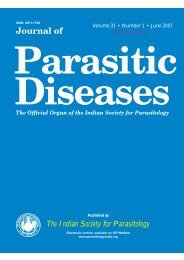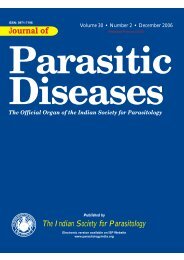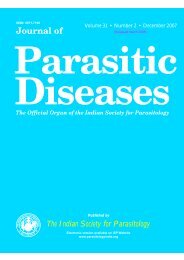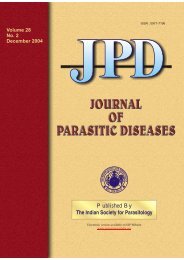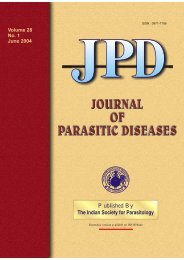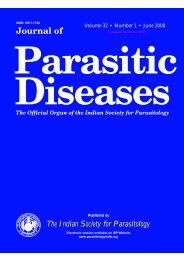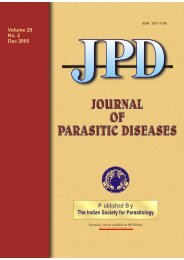Vol 27 No 2 December - The Indian Society for Parasitology
Vol 27 No 2 December - The Indian Society for Parasitology
Vol 27 No 2 December - The Indian Society for Parasitology
You also want an ePaper? Increase the reach of your titles
YUMPU automatically turns print PDFs into web optimized ePapers that Google loves.
82 Parasitic infections in travelers<br />
JPD : <strong>Vol</strong>. <strong>27</strong> (2), 2003<br />
areas. <strong>The</strong>se infections are associated with a major threats to the health of a traveler, so that<br />
protracted course, especially in immunocompromized appropriate prophylactic measures could be<br />
individuals. Moreover, debility in the <strong>for</strong>m of weight undertaken (Steffen et at, 1987).<br />
loss is severe in patients with a prolonged illness.<br />
To conclude, travel will continue to be source of<br />
Increased awareness, leading to high index of clinical<br />
human enlightenment, rejuvenation, and betterment<br />
suspicion, timely diagnosis, and appropriate therapy<br />
only when the traveler is safe, and is protected from the<br />
can reduce morbidity and mortality to a great extent.<br />
vices of nature. Increased knowledge and<br />
Weekly chemo-prophylaxis against malaria, understanding of the epidemiology of tropical<br />
protective clothing and insecticide-treated bed nets, parasites is one of the significant steps in the<br />
application of insect repellants, adherence to safe sex achievement of this much-desired objective.<br />
guidelines and selection of safe food and water may<br />
protect the travelers from these infections. Traveling<br />
Box I<br />
to underdeveloped countries necessitates the Reasons <strong>for</strong> the increased susceptibility of travelers to<br />
implementation of several important preventive parasitic infections<br />
measures, such as vaccination and bringing water 1 False sense of security and confidence among travelers about<br />
ecological, environmental, health, and hygienic measures in<br />
boiling apparatus (Box II). It is recommended that different tourist resorts.<br />
after arriving in the underdeveloped country, travelers 2 Lack of protective immunity among travelers from nonendemic<br />
region visiting a country with high endemicity.<br />
must avoid unheated water, ice, beverages containing<br />
ice, raw vegetables, fruits cut by local people. 3 Absence or inadequate pro-travel advice or counseling.<br />
However, many travelers do not pay much attention to 4 Adventure tourism in tropical countries with poor sanitation<br />
and high vector density.<br />
these points, resulting in increasing numbers of<br />
5 Consumption of unboiled local water, beverages, ice, and ice<br />
tropical orally contracted intestinal diseases. In containing beverages, fruit juices, and salads by travelers.<br />
addition to the education of travelers about preventive 6 Inadequate personal protection like non-use or irregular use of<br />
measures, doctors who will see patients returning mosquito nets, long sleeved garments, shoes.<br />
from underdeveloped countries must be able to 7 Bathing in unclean water.<br />
recognize and treat tropical diseases. Un<strong>for</strong>tunately, 8 <strong>No</strong>n-compliance to chemoprophylaxis.<br />
this is often not the case in developed countries,<br />
resulting in delays in diagnosis and treatment, it is<br />
Box II<br />
imperative to diagnose communicable diseases as Dos and don'ts <strong>for</strong> travelers visiting tropical countries<br />
quickly as possible to avoid complications and<br />
1. Wear protective clothing and shoes to avoid insect bites and<br />
unnecessary secondary infections. Thus, <strong>for</strong> a traveler exposure of the feet to soil.<br />
to the developing world accumulating knowledge on 2. Avoid bathing in unclean water.<br />
the current hygienic conditions in the tropical country 3. Never drink unbottled water.<br />
must also be one of the necessary preparations 4. Drink bottled mineral water from a reputed company.<br />
(Sakaue, 1997).<br />
5. Avoid consumption of ice, ice containing beverages, fruit<br />
juices, salads.<br />
Questionnaires can be an effective tool in the 6. Consult advice of counselors and physicians about<br />
assessment of health-risk associated with short-term prophylactic measures to be adopted during or be<strong>for</strong>e travel.<br />
(less than three months) travel to developing countries 7. Take chemoprophylactic drugs in adequate dosages as<br />
recommended by a qualified physician.<br />
from developed nations. Steffen and colleagues in a<br />
8. Maintain strict compliance with chemopro-phylactic<br />
study has shown the usefulness of questionnaires to<br />
regimens.<br />
assess health risk associated with travel to tropics, In 9. Take drugs in serious diseases under supervision.<br />
their study, questionnaires designed to elict 10. Take prophylaxis <strong>for</strong> malaria 2 weeks be<strong>for</strong>e journey and<br />
in<strong>for</strong>mation regarding pre-travel vaccinations, continue <strong>for</strong> 4 weeks after return from endemic region.<br />
malaria prophylaxis, and health problems during and 11. Discourage children and pregnant women from traveling to<br />
after their journey in 10,524 travelers (with an answer endemic zones. <strong>The</strong> disease becomes more severe and may<br />
even to lead to fatality in such cases. Incase, already affected,<br />
rate of 73.8%) showed that the incidence of infection they should be shifted to the nearest hospital where special care<br />
per month abroad was 7/1000 <strong>for</strong> giardiasis, 4/1000 can be given.<br />
<strong>for</strong> amebiasis, and 1/1000 <strong>for</strong> malaria. Such 12. Carry the necessary itineraries like bed nets, personal<br />
in<strong>for</strong>mation was extremely valuable in identifying the prophylactic drugs and mosquito repellants right from<br />
beginning of the journey.



